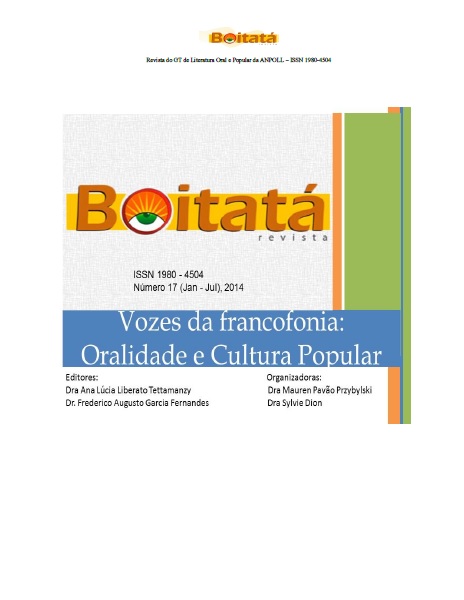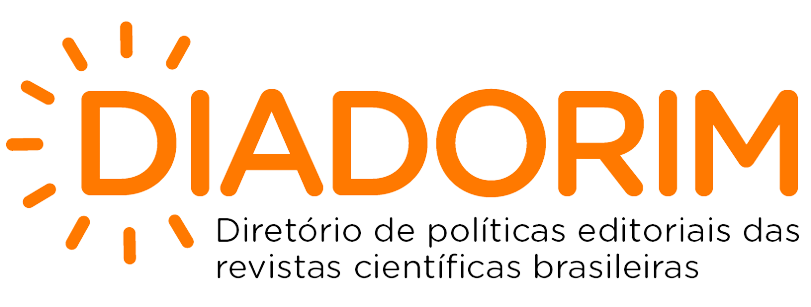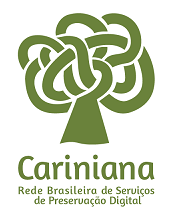Words: complaint to violence and identity ecos in NGA Fefa Kajinvunda, of Boaventura Cardoso
DOI:
https://doi.org/10.5433/boitata.2014v9.e31623Keywords:
Female voice, Exploration, Violence, Resistance, SubversionAbstract
Portuguese colony, Angola was under the control of this capitalist company in the course of five hundred years. Independence took place in 1975. It is from this scenario that the work of tales Dizanga dia Muenhu, by Boaventura Cardoso, published in 1977. The writer was not willing to translate the book's title event that raises the hypothesis that it is up to the reader to investigate the term in quimbundo, group ethnolinguistic of the Bantu people, aesthetics of valuing the culture of African oral tradition. From the tales, we elected Nga Fefa Kajinvunda, in which the protagonist is made by the word. It is one of the countless women who trade in the outdoor market. The violence process is substantiated by authoritarianism of the male universe over the female and for the supremacy of the European vision at the expense of to the black person. Therefore, the purpose of this article is to analyze the forms of resistance of the character feminine, which is supported by the voice, the living discourse, to mirror the writing of Boaventura Cardoso, coping and the refusal to cancel. Thus, the voice is covered with signs. Representative of the community, it is forged in writing, a resource used to break the siege of invisibility imposed on Angolan society. In the literary plot, the compositional elements are interwoven with words from around the world Portuguese language, creating a writing that reflects the orality that, in addition to violence, exploitation, racism, functions as an identity humus.
Downloads
References
CHAVES, Rita; MACÊDO, Tânia; MATA, Inocência (orgs) Boaventura Cardoso: aescrita em processo. São Paulo: Alameda, União dos Escritores Angolanos, 2005
CARDOSO, Boaventura. Dizanga dia Muenhu. São Paulo: Ática, 1982.
CARDOSO, Boaventura. Entrevista à Revista Metamorfoses, em 14 de janeiro de 2010. Disponível em: http://www.ueangola.com/entrevistas/item/375-entrevista-%C3%A0-revista-metamorfoses. Acesso em 5 de junho 2014.
Dicionário Priberam da Língua Portuguesa. Disponível em: http://www.priberam.pt/dlpo/. Acesso em 5 de junho 2014
RATTS, Alex. Eu sou atlântica: sobre a trajetória de vida de Beatriz Nascimento. São Paulo: Imprensa Oficial do Estado de São Paulo: Instituto Kuanza, 2007.
THOMPSON, Paul. A voz do passado: história oral. Tradução Lólio Lourenço de Oliveira. 3ª ed., Rio de Janeiro: Paz e Terra, 1992.
ZUMTHOR, Paul. A letra e a voz: a "literatura" medieval. Tradução Amálio Pinheiro, Jerusa Pires Ferreira. São Paulo: Companhia das Letras, 1993.
ZUMTHOR, Paul. A letra e a voz: a "literatura" medieval; tradução Amálio Pinheiro; Jerusa Pires Ferreira. São Paulo: Companhia da Letras, 1993.
Downloads
Published
How to Cite
Issue
Section
License
Copyright (c) 2014 Boitatá

This work is licensed under a Creative Commons Attribution 4.0 International License.
Boitatá esta licenciada com CC BY sob essa licença é possível: Compartilhar - copiar e redistribuir o material em qualquer suporte ou formato. Adaptar - remixar, transformar, e criar a partir do material, atribuindo o devido crédito e prover um link para a licença e indicar se mudanças foram feitas.






















